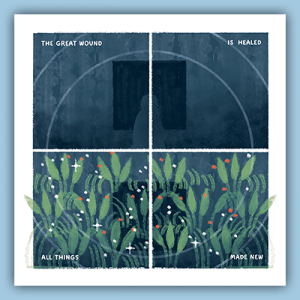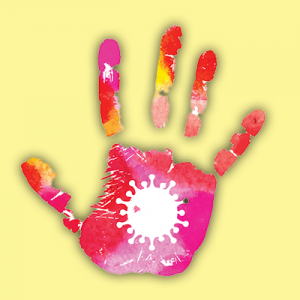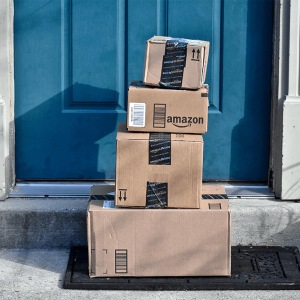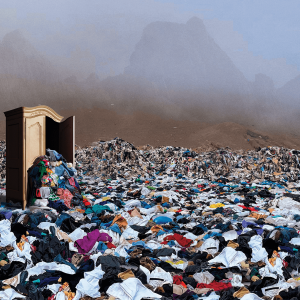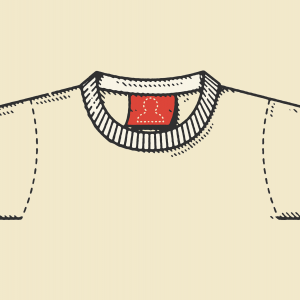
Céire Kealty holds a doctorate in theology from Villanova University, where she studied fashion theory, spirituality, and ethics. She lives in Pennsylvania.
Posts By This Author
The Mysticism of Anime
Naoko Yamada’s film The Colors Within conveys vivid truths.
WHEN THE VATICAN introduced an anime-inspired mascot named Luce for the Year of Jubilee, online critics called it creepy, uninspiring, even “deeply evil.” The pushback against the cheerful, blue-haired pilgrim isn’t that surprising given the way anime is often stereotyped as an immature medium. Yet as animator-director Naoko Yamada demonstrates in her latest film, The Colors Within, anime can convey important existential truths.
Anime (Japanese animation) originated in the 1900s and spread across the globe with the advent of the internet and streaming services. Signature attributes of anime—including big-eyed characters with vibrant hairstyles—attract interest and, occasionally, scorn. Yet Japanese studios like Studio Ghibli have done well to engage with serious topics, from fascism to the devastations of war. Yamada’s work gives us another reason to take this medium seriously.
Comics, but Make Them Anti-Capitalist Poetry
Four panels took me from doom to a sacred place, like a numinous telegram.
I FIRST CAME across digital media artist Madeleine Jubilee Saito’s work on social media. While scrolling through a sea of Instagram stories about environmental disasters, civil unrest, and humanitarian strife, I reached a square that made me pause: a multicolor four-panel image from a digital watercolor comic. I took in the top two panels of a gray figure staring out into the sky and then the glimmering, fruited foliage framing the bottom two panels. It felt like a vision from a better, more just future. The text on each panel, though brief, was powerful. I took in each word like a sacred telegram: THE GREAT WOUND / IS HEALED / ALL THINGS / MADE NEW.”
When I was younger, I found comfort in dynamic plotlines nestled in the predictable geometry of print and online comic series. Through Saito’s work, that comfort returned to me, in the form of four panels grappling with climate grief and environmental repair.
When I spoke with Saito about her work, she said that her affinity for comics started in high school. “As a young person, I had a very hard time accessing my own feelings or seeing that my interiority or my life were particularly valuable,” she said. “Comics were a way I could crystallize that value and the meaning of my own interiority for others — make it visible.” Now, Saito’s work conveys the value of the natural world. In her ecological storytelling, we see portraits of people amid towering trees and shimmering waterways. Her human subjects submerge themselves in the elements; her natural subjects invite readers to take a closer look at this numinous world.
Her upbringing in northern Illinois exposed Saito to the tensions between humans and earth. She grew up in a house deep in the woods — “a strip of forest in the middle of this desolate monocrop landscape,” she said, explaining how she saw beauty amid exploitation. “The animals — raccoons and possums — were pests to be managed. Every year the trees and bushes and plants from the forest would encroach further toward the house and every year they would need to be cut back.”
This awareness of the adversarial relationship with the natural world has guided her work and now culminates in her debut book, You Are a Sacred Place: Visual Poems for Living in Climate Crisis (Andrews McMeel, 2025). The first section explores the doom happening parallel to climate collapse. In one story, we see someone curled up in bed, sinking into and verbalizing their sadness post-job layoff. Wildfire smoke chokes the Seattle air around them. In this panel, I see myself, two years ago, numb from financial despair while wildfire smoke cast a noxious orange hue over Philadelphia.
Coronavirus Turns Five
Do we accept the “new normal”?
ON MARCH 11, 2020, the World Health Organization declared a global pandemic of covid-19. The virus causing covid had already been circulating for at least four months. People were dying from some kind of strange pneumonia. In the five years since, our world has changed. As of December 2024, there were more than 7 million covid deaths worldwide (the actual number is likely three times that high) and 1.2 million were in the United States. The coronavirus has left an indelible mark on relationships, social institutions, and politics.
In 2025, we are still dealing with the shock and trauma of who and what we lost. Our sublimated grief, confusion, and anger too often manifest as personal denial, social apathy, or political individualism. All while the virus persists among us. For proper healing and to navigate this “new normal,” we must first square the last five years.
From the jump, the U.S. failed to provide an adequate pandemic response. President Donald Trump, in his first term, was handed an unexpected event — but not an unprecedented one. Preparations for a mass public health event were available, but by politicizing public health his administration left the country vulnerable. In 2018, Trump’s national security adviser oversaw the disbanding of the global health security team. Trump’s adversarial stance toward China, including increased tariffs, negatively impacted the supply of personal protective equipment (PPE) available in the U.S. In those first key months, the administration chose propaganda, not science, to fight the pandemic. In May 2020, Trump pulled the U.S. out of the World Health Organization (as he did again in January this year), which was coordinating a global response.
This Lent I'm Fasting From Retail Therapy
For the past month, I struggled to decide what to “fast” from. Quiet contemplation bore rich insights for Christian monastics, so I turned to silence and tried to listen to God. But no sooner did I seek out a moment of quiet, than I heard the unmistakable ping of my inbox coaxing me to “Act now!” “Check out these deals!” “Hurry!” and “Buy, buy, buy, buy!” Regardless of the brand, these retail messages are constant, pervasive, and often persuasive.
The Demon, the Desert, and the Wardrobe
Monstrous mountains of our own making are growing in number in the driest non-polar desert on Earth.
Monstrous mountains of our own making are growing in number in the driest non-polar desert on Earth.
How Your Church Should Respond to Long COVID
While it is tempting to resume "normal" life and to ignore the empty pews and medical complications of ailing congregants, we must resist this easy way out.
THROUGHOUT THE PANDEMIC, church attendance has varied wildly. As precautions have fluctuated with every ebb and flow of the virus, congregants have had to balance their attendance with health concerns—and this balancing act has proven even more complicated for high risk and immunocompromised parishioners.
Government officials and political figures now encourage citizens to “live with COVID.” The faithful may be puzzled by still-empty pews. Where are our neighbors? Have they lost faith? Or do they still “live in fear”? These assumptions fail to consider a more troubling reality: Some neighbors are suffering from long-term illness resulting from COVID-19.
Though recent viral variants have been touted as mild, reports show that many people who tested positive for COVID-19 can struggle with ongoing health problems. This condition, called “long COVID,” affects one in three people who came down with the virus and had symptoms for months following the initial infection. A 2021 study shows that 57 percent of people who contracted COVID-19 were still experiencing symptoms up to six months after testing positive—including cardiovascular issues, neurological problems, brain fog, muscle pain, and fatigue. For sufferers, long COVID is debilitating and life-altering.
What Your Clothes Say About You, According to the Bible
Today, believers can strive to keep their priorities consistent with their dress. Before purchasing a Jesus T-shirt, wearers should consider if the garment was made under safe and fair working conditions. Believers can use their voice to pressure beloved clothing brands to respect the dignity of garment workers, through living wages and good working conditions. Believers can also wear clothes that reflect the dignity of the earth, choosing clothes from eco-conscious brands, or just by buying second-hand.
This Valentine's Day, Fair Trade Chocolate Isn't Enough
Valentine’s Day is the day of romantic love. If we take our cues from advertisements, it’s an opportunity to purchase and consume flower bouquets, candies, chocolate-covered strawberries, and frilly negligees — gifts we bestow upon our beloveds to show the depths of our love. But many of the gifts we give on Valentine’s Day are made available for our consumption through the exploitation of others; they convey romantic love at the expense of love of neighbor.
Whose Suffering Are You Wearing?
Going beyond ethical shopping to stand in solidarity with garment workers.
OUR CLOTHES BEAR more than our personal style. Stitched into favorite garments is the suffering of those who made them.
From Bangladesh to Vietnam, millions of garment workers are exploited to feed the burgeoning demand for ready-made wardrobes. These workers endure unsafe working conditions and workplace abuse to meet the mounting quotas imposed by hungry clothing brands—all while being paid pennies per hour.
Garment workers’ labor conditions seized the attention of international media in 2013 when the Rana Plaza factory collapsed in Dhaka, Bangladesh, killing more than 1,100 people. This disaster accelerated the work of human rights organizations such as the Worker Rights Consortium, the Maquila Solidarity Network, and the Clean Clothes Campaign that were already collaborating withcorporations to implement safety protocols in the supply chains. This collaboration birthed the Accord on Fire and Building Safety in Bangladesh (the “Bangladesh Accord”), which was the first international agreement to include global brands, retailers, and trade unions in a legally binding framework.

